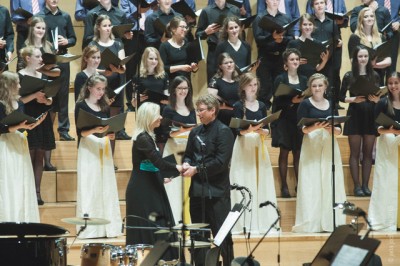
The Slovene Requiem’s premiere was given on 10th May, 2015 at the 22nd annual concert of the choirs and orchestra of St. Stanislav’s Institution in Cankarjev Dom, Ljubljana.
Anniversaries and memories are often an incentive and inspiration to create new compositions or other works of art. War is mostly perceived as a conflict between states, nations, religions or ideologies, behind which the stories of individuals and families who were caught in its turmoil are actually revealed. The Deliver Me, Anti-War Song /Libera me – Carmen Adversus Bellum/ is a unique anti-war composition, in which in addition to the passage from the Requiem on the apocalypse and man’s fear of death, the lyrics of a heart-breaking Istrian folk song Who Would Like to Mow My Grass? /Ki Će Moju Travo Kosit/? were used. Music clearly depicts man’s fear of hostile forces and his plea for salvation. For quite some time, I had been thinking of composing a requiem for all Slovene victims of 20th-century war, evil, violence, and massacres. Having read various historical and literary texts and thus became acquainted with different perspectives of people involved in this terrible chaos of hatred and violence, I decided, after careful consideration, for love to be the common theme of my composition. The Slovenian Requiem is, therefore, not a complicated and ostentatious piece of music for a big ensemble, but a simple composition for solo soprano representing an individual and mixed choir representing a crowd. They are accompanied by ison, which is not only a drone note or a slow-moving lower vocal part used in Byzantine chant, but also a foundation of the melody, which adds a touch of festivity and power. The text is composed of different passages from Sophocles’ play Antigone, Dominik Smole’s play of the same title, Gregor Strniša’s poem Willow /Vrba/, John’s Gospel, and Latin Mass for the dead.
The Slovenian Requiem is a strong rejection of hatred, a fervent wish for forgiveness and mercy as well as a firm decision for love and peace. I dedicate this piece of music to all Slovenes to come together and create a future of mutual understanding, tolerance, respect, and love.
Damijan Močnik